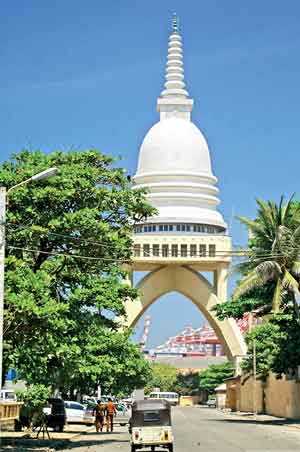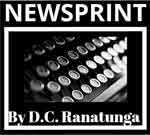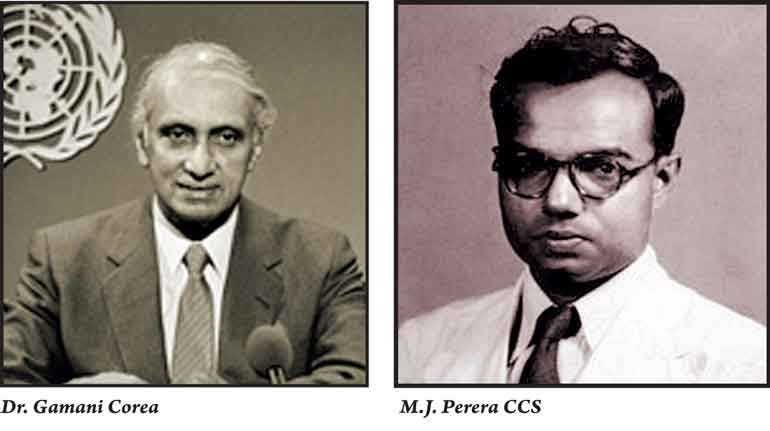Saturday Feb 14, 2026
Saturday Feb 14, 2026
Saturday, 2 March 2019 00:00 - - {{hitsCtrl.values.hits}}

Among the contacts I made in the early days on the ‘Dinamina’ were several bureaucrats who were ‘thorough gentlemen’.
Dr. Gamani Corea, the country’s most distinguished economist, highly-acclaimed worldwide, was one. As Director of the Planning Secretariat and Secretary of the National Planning Council (NPC), the simple, amiable bureaucrat was always ready to discuss the activities of the Secretariat. Not many bureaucrats freely spoke to journalists.
After a prior appointment I used to walk to his office in Chaitya Road, named after the dagoba built near the entrance to the harbour to mark the Buddha Jayanthi (1956/57).
The Council was set up under the National Planning Council Act (No 40 of 1956). Professor Das Gupta of India was invited to be the Chairman of the NPC.
In addition to the news stories, I used to interview Dr. Corea and ‘ghost write’ on his behalf for the ‘Sanduda Athirekeya’ – a special four-page supplement published every Monday on a tropical subject.
Often a minister related to the subject was invited to write along with an opposition MP. Several others also contributed. Though it was the task of the features desk to plan and get the articles organised, those in the news desk lent a hand since they had the contacts.
Dr. Gamani Corea (1925-2013) later became the Secretary-General of the United Nations Conference on Trade and Development (UNCTAD) and Under-Secretary-General of the United Nations (1974-’84), Ceylon’s Ambassador to the EEC, Belgium, Luxembourg and the Netherlands, Permanent Secretary of the Ministry of Planning and Economic Affairs of Ceylon and Senior Deputy Governor of the Central Bank of Ceylon.
He set up the Gamani Corea Foundation mainly to promote and conduct research in economics and other related fields of learning. He left a substantial amount his wealth mainly for the Foundation to award fellowships and scholarships for post-graduate studies in universities.
Another official I used to meet often was M.J. Perera, the Director of Information. His office was in Fort. Having got selected for the CCS (Ceylon Civil Service) he had held several posts in the district offices prior to being appointed as head of a department. He later became the first Sri Lankan Director General of Radio Ceylon – as the oldest broadcasting service in South Asia was then known. He succeeded John Lampson of the BBC.
 MJP’s efficiency took him to greater heights becoming head of several departments. His contribution for the progress of local arts was quite noticeable during his tenure as Director of Cultural Affairs and later as Permanent Secretary of the Ministry of Education and Cultural Affairs.
MJP’s efficiency took him to greater heights becoming head of several departments. His contribution for the progress of local arts was quite noticeable during his tenure as Director of Cultural Affairs and later as Permanent Secretary of the Ministry of Education and Cultural Affairs.
After retirement he was invited to serve on several commissions and on boards of semi-Government institutions. Even after I left Lake House in 1969, I continued to meet him for an occasional chat.
The March 1960 general election brought me in contact with the Commissioner of Elections, Felix Dias Abeysinghe. He was ready to meet me and once he had confidence in me, he used to discuss even information of a sensitive nature.

“Not for publication,” he would say but such information was useful to get a total picture of a situation. I never let him down and he would agree whenever I suggested ‘ghost writing’ a feature article under his name.
He had a long stint as Commissioner of Elections (March 1957-May 1978), handling five general elections and several by-elections and local government elections. Year 1960 saw two general elections in a space of five months – in March and July – when the UNP Government faced a no confidence motion and lost, and Prime Minister Dudley Senanayake called for another election.
His term in office saw many changes. From March 1960 the general election was held on a single day and from 1965 everyone over 18 years got the right to vote (from 1931 only those over 21 could vote). With the population increase the Delimitation Commission adjusted the number of electorates which automatically increased, which in turn meant the increase of polling booths. More and more political parties contested resulting in more contestants.
This is only a glimpse of three bureaucrats of a bygone era who were friends of the media. There were many more. There are plenty even today, I guess.